Perhaps Trump’s new tariffs are negotiation tools, since both the NAFTA talks as well as the EU-US trade talks have stalled. However, let’s quickly analyze his tariffs on steel and aluminum imports to see why they aren’t logical or effective.
** The tariffs are illegal. The US and its partners are bound by WTO and NAFTA treaties/agreements. Countries cannot just willy-nilly impose unilateral tariffs. Either we have to renegotiate or get out of these treaties.
** “National Security” – Fake Excuse. No, Canada, Mexico and EU don’t pose any threats to our national security! LOL. And the situation vis-a-vis steel/aluminum industry isn’t any threat to our security either — see below for discussions on that topic.
** Canada is not ripping us off: US-Canada bilateral trade is whopping $670 billion a year, only just barely below our trade with China. And … we have a trade surplus of $8 billion with our good neighbor.
As for the misleading statistics of Canada charging 270% tariff on US dairy … that’s only in rare situations when imports exceed Canadian quotas. (BTW, the US also has a similar system where it charges 350% tariff for tobacco). In reality, such after-quota tariffs are rarely imposed. Last year, we sold $600+ million worth of US dairy products to Canada, which also happens to be our #2 export market. Moreover, we have a trade surplus with Canada regarding dairy!
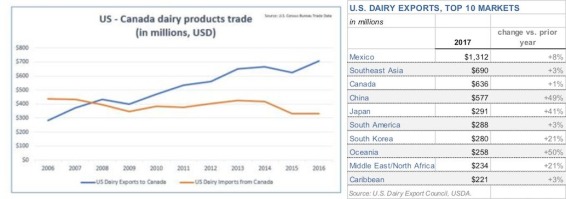
Overall, Canada is the #1 export market to 35 states in America. So, leave them Canadians alone!
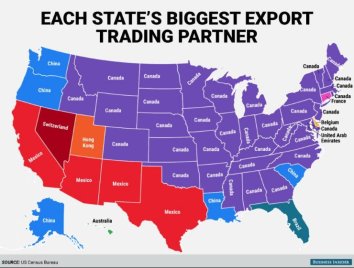
** US Steel Industry is not in dire shape. To listen to Trump, you would think that our steel industry is completely devastated and we’re totally dependent on other countries, making this an existential threat to America!
Yes, we’re the largest importer of steel in the world, and that’s sad, especially when considering that we used to be the #1 producer and the #1 exporter of steel a few decades ago. Now, the US only accounts for 5% of global steel production, and China is 10x larger than the US.
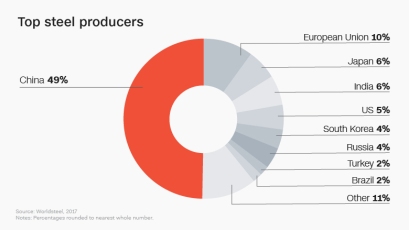
Today, we don’t even make enough steel to meet our own needs. In 2017, we imported about $30 billion worth of steel.
That said, we still produce 80 mmt (million metric tons) of steel every year. And we import 35 mmt. So the production-import ratio is 70-30. It’s not great, but it’s not a “national security” or the end of the world.
** US Steel prices are up: Again, the hysteria makes it look like everyone is dumping steel into America. If it were the case, prices of steel would be plummeting and the stock prices of US steel corporations would be crushed. In the fact, the reverse is true. US steel prices are up 50% in the last few months and have almost doubled since Trump took office.
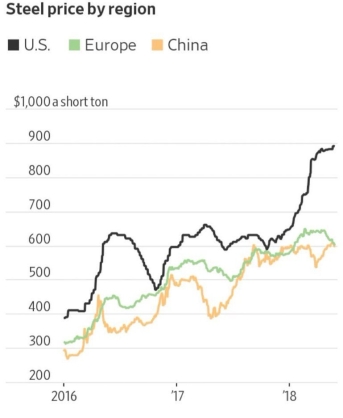
And the share price of US Steel Corp is healthy on an upward swing
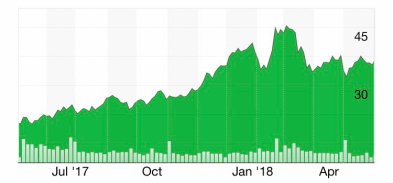
** China is NOT killing us. Chinese steel account for less than 2% of what we import. Most of our imports come from traditional allies like Canada, Brazil, South Korea etc. As for Mexico, it only accounts for 9% of US imports.
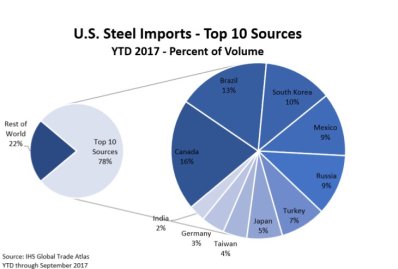
** Canada and Mexico also buy our steel. Canada and Mexico aren’t just selling steel to us. They also buy 90% of our steel. So they help our industries and create American jobs. Thus, when Canada and Mexico retaliate and impose tariffs on US steel, it will negatively impact some US companies.
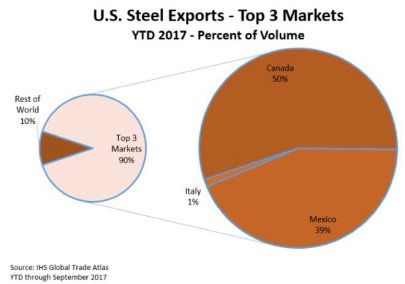
** Won’t help US jobs: People think that the tariff will help US corps employ more workers and increase steel and aluminum production. It won’t happen unless the companies know that these tariffs are permanent. Since everyone is suing the US at WTO, expect these tariffs to last anywhere from a few weeks to a few months.
Even if the tariffs are permanent, they won’t make any difference with aluminum, where we depend on imports for 90% for our needs. The 10% tariff is too small to alter the aluminum industry.
The 25% tariff on steel — even if it’s permanent — will probably just mean that (a) US corporations will make more profit and (b) many buyers will simply shift from Canada/Mexico/EU to China or other countries that are not being targeted!
Trump’s Tariffs on Washing Machines, Lumber, Solar Panels etc.
Similarly, Trump levied heavy tariffs on Canadian lumber, but the US lumber industry wasn’t suffering at all. Look at the lumber price over the last couple of years:
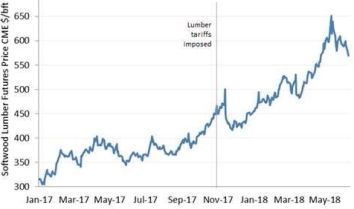
And Trump’s tariffs on washing machines simply means the prices are going up “bigly”. Millions of Americans are experiencing needless inflation.
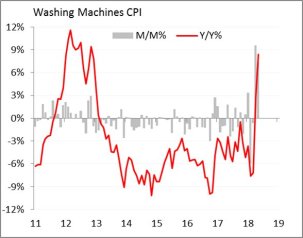
Similarly, his 30% tariffs on solar panels are resulting in job loss in installation companies, although it may boost some domestic manufacturing. So, it’s a mixed bag.
** US Consumers will feel the pain: As for Steel and aluminum, they are intermediate goods that are used in numerous industries and goods — construction, automobiles etc. Trump’s tariffs are simply extra taxes, which will raise the price and cost for many products, and eventually US consumers will pay more for everything from cars to cans.
** Retaliation tariffs bad for the US: EU, Canada and Mexico have responded with retaliatory tariffs. For every dollar of US tariff, all those trade partners have issued corresponding tit-for-tat tariffs.
EU has released a 10-page list of all the US goods that will face additional tariffs. These goods include steel, aluminum, Bourbon whiskey etc. Canada’s list of tariffs on US goods include steel, chocolate, mustard, ketchup etc. Mexico will target US steel, pork, apples etc.
Basically, they are targeting “red states” and rural counties that are pro-Trump! This is similar to China’s strategy as well when it threatened soybeans and sorghum imports from the US.
Conclusion
Tariffs are essentially socialist and anti-free market tools. Sometimes they are necessary if a country needs to protect fledgling markets from foreign competition or boost domestic employment or safeguard national interests (such as hi-tech industry or defense-related technology). However, the strategy must be carefully planned out.
The US cannot just bully its way into deals; we need more diplomacy and we need to focus on win-win. The US isn’t the almighty trading superpower that it used to be.
We have lost manufacturing jobs because the US corporate elites 1) want cheap labor from other countries 2) don’t like the fact that manufacturing is inherently a low-margin business, and 3) prefer to spend hundreds of billions of dollars on stock buybacks rather than building factories and employing American workers.
Needlessly, Trump is antagonizing European countries and leaders. At this rate, the only friend for Trump next year will be Kim Jong Un!
Blaming foreigners is always a political winner, but it’s not based on facts.
Author: Chris Kanthan
( ![]() Check out Deconstructing the Syrian War, my new e-book on the Syrian war, the most consequential war of recent times)
Check out Deconstructing the Syrian War, my new e-book on the Syrian war, the most consequential war of recent times)
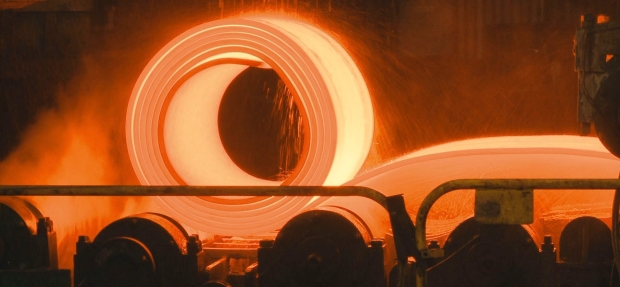
Reblogged this on seachranaidhe1.
LikeLike